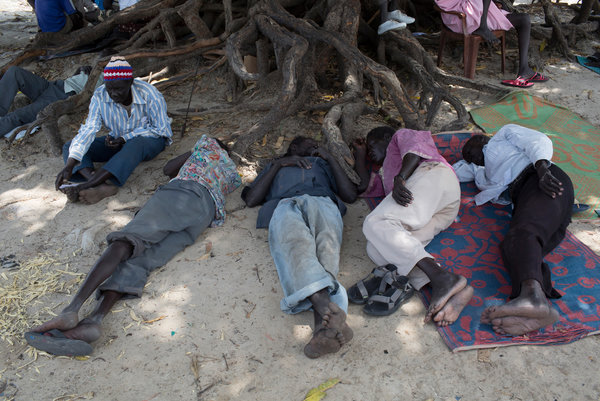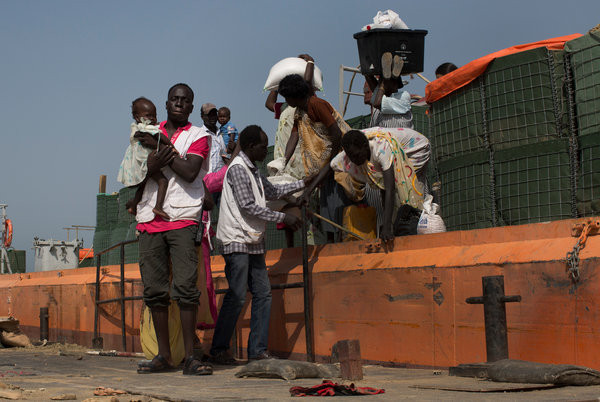PBS: Escaping Eritrea … [Read More...] about ካብ ውሽጢ ቤት ማእሰርታት ኤርትራ
A Search for Survival and Family Amid the Violence in South Sudan
WAU SHILLUK, South Sudan — It had been more than a month since Theresa James had seen her two small children. She was only 13 miles away from them, across the Nile River, in what used to be a hamlet of 3,000 people. Then the town was bursting with 50,000 men, women and children seeking refuge from a civil war that continues to tear the country apart.
“I don’t know how my children are doing,” said Ms. James, who was separated from her children and other family members when the recent clashes broke out. For more than a month, humanitarian workers had been unable to reach this place, home to people who until recently were aligned with the government. Now the townspeople here are branded rebels and terrorists.
For more than a month, no food, medical treatment or clean water arrived. With a lack of supplies, an already bleak situation soon became so unbearable that roughly 10,000 people left, taking the chance that they would be able to hike for days through wilderness and desert to flee.
Some even headed to Sudan — the country that South Sudan had battled with so fiercely for decades and had finally won its independence from four years ago. Suddenly, some saw it as their best hope for survival. William Dak, 52, said he was not sure how much longer the people remaining here could make it. “If we had to live another three months like the last month, we will not survive,” he said. “The people will die.”
More than 1.5 million people have been forced from their homes since South Sudan descended into civil war 18 months ago, the consequence of a power struggle among the nation’s leaders that quickly inflamed old ethnic tensions and engulfed the country. About 130,000 people have sought shelter in bases run by the United Nations. But the majority of the displaced have employed a strategy learned from decades of conflict: fleeing to places like this on the banks of the Nile, hoping that the swelling waters of the summer rains would offer protection.

But they are fleeing in staggering numbers, and even if tensions ease, those same waters may soon leave them cut off from the world.
It is hard to overstate the scale of the humanitarian relief effort and the challenges of working here. Many people abandoned farms and livestock amid the violence. And the government’s dwindling resources have been largely dedicated to the war, leaving it to international agencies to provide for virtually every basic need of those seeking refuge. Last week, Unicef said that because of the fighting, relief efforts could not reach 750,000 people in the greater Upper Nile region, which includes this town, Wau Shilluk.
In addition to the 13,000 United Nations peacekeepers in South Sudan — one of the largest missions in the world — there are tens of thousands of other workers in the country to support hundreds of domestic, international and United Nations-affiliated groups. Already this year, the United States has spent nearly $400 million in assistance through the United States Agency for International Development, bringing the total spent since the beginning of the civil war to $1.1 billion.
All that came after the world invested billions to help usher South Sudan into existence. Now, the United Nations says this year alone another $1.63 billion is needed to stave off the hunger and deprivation facing millions of civilians thrown into turmoil by the war. As the fighting rages on and reports of atrocities on all sides continue to emerge, officials say a sense of donor fatigue is setting in, at time when they can least afford it.
But even with unlimited aid, the war — being fought largely by untrained, undisciplined and unaccountable young men — is often making it impossible to deliver help where it is most needed. Humanitarian workers have been subjected to gunfire, had their supply depots looted and had their offices ransacked.
The fighting in the Upper Nile and in Unity State, where the main rebel force is strongest, was so fierce in May that distribution teams from the World Food Program evacuated the area and six rapid response missions intended to help about 155,000 people were canceled. This month, officials said, aid teams were starting to reach some of the displaced civilians, but they were in a race against time.
The government released a video of what it viewed as a major victory: repelling rebel forces in the town of Melut, just north of here, near South Sudan’s last working oil field. With its upbeat music and scores of marching troops, the video showed little of the impact on the civilians living in the area.
“Melut is deserted — almost 50,000 people have completely disappeared,” said Fred McCray, operations director for World Vision in South Sudan. “All that is left of the town is burned-out buildings. Our compound has been looted and equipment damaged or destroyed.”
Like other groups, World Vision negotiates access with local leaders, a painful and slow process with no guarantees. This month, several aid trips here were canceled at the last minute because of clashes. On June 17, two organizations — Doctors Without Borders and Solidarités International — were finally able to reach this village, traveling by boat up the Nile with small teams.
What they found raised deep concerns about the fate of tens of thousands of people.
Witnesses described how armed men had recently abducted as many as 100 boys, adding to the 13,000 children the United Nations estimates have been recruited to fight in the war. For the thousands of people still in the village, a daily meal often consisted of little more than a bowl of white sorghum or lentils. Those still hungry ate grass plucked from the banks of the Nile.

With the bank near the village largely stripped clean, women were sent to fetch supplies across the river, an area controlled by government soldiers. Many returned with accounts of abuse and rape, further fueling animosities. “We can only send the women because if we go they will kill us,” said Stephen Aba, 39, a village supervisor.
The town is largely Shilluk, one of the nation’s biggest ethnic groups. But after a Shilluk militia broke from the government, the residents said they were in a virtual prison, even though they were not involved in the fighting.
Michael Mojowk, 52, said he was lucky to have one meal a day. He asked a 9-year-old boy standing nearby the longest period in the last month that he had gone without a meal. “Five days,” was the soft reply. The town was never meant to support a population of this size, and it struggled even before the Shilluk broke from the government. Last year, when aid workers could reach the town, a lack of basic sanitation fueled a cholera outbreak.
Lapo Simigli, who works for Solidarités International, a French-based nongovernmental organization that is providing clean water to Wau Shilluk, has worked in some of the toughest, most violent places on earth. “This is by far the most hostile environment,” he said, “even without the clashes.”
Mr. Simigli named deadly insects, poisonous snakes, crocodiles and terrible weather as just a few of the challenges, even without the fighting. During a brief lull in the fighting, Solidarités aid workers made it back to the town. Staff members told Mr. Simigli that there was a woman — Ms. James — who was hoping to be reunited with her family in the United Nations camp in Malakal.
When the team was ready to leave, they brought her along. At great expense, Ms. James bought two chickens, the first meat she would eat in a month, and a bag full of small fish caught in the Nile. She held it close, hoping to have a celebration when she found her family.
The boat they rode set off just as a late afternoon rainstorm approached, dark clouds hanging low over the river and whipping winds bending the reeds on the shoreline. There was silence as the passengers buried their faces to avoid being pelted by the rain.
After about 15 minutes, the rain stopped, the clouds cleared and everything was serene and beautiful. Then the passengers heard two quick pops. It was gunfire, and it was close. The two shots were followed by several additional bursts that seemed to be tracking the boat. Everyone dove to the floor, cramming tight beside the chickens and fish.
Suddenly, the boat stopped. Some feared the driver had been shot. But he had merely sought the cover of reeds on the riverbank. Soon after, he was driving again, speeding to the port near Malakal, which is controlled by the United Nations, leaving whoever had targeted the vessel in its wake. No one was injured. Ms. James made it to the camp with only one thing on her mind.
“I want to see my children,” she said before setting off into the maze of tents, hoping that the 1-year-old and 3-year-old had had a better month than hers. But the attack on the boat — which was clearly flying the flag of the aid group — meant that assistance, at least temporarily, would once again be kept from the town she left behind.
